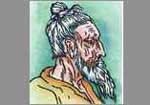 Fakir Lalon Shah (1774-1890), was a Bengali philosopher poet. He lived in the village of Chheuria in the district of Kushtia,Bangladesh. Lalon composed numerous songs and poems which describe his philosophy.
Fakir Lalon Shah (1774-1890), was a Bengali philosopher poet. He lived in the village of Chheuria in the district of Kushtia,Bangladesh. Lalon composed numerous songs and poems which describe his philosophy.
Among his most popular songs are: khachar bhitor auchin pakhi, jat gelo jat gelo bole, dekhna mon jhokmariay duniyadari, paare loye jao amay, milon hobe koto dine, aar amare marishne maa, tin pagoler holo mela, etc.
Lalon Shah’s songs are considered classics of the Bangla language. According to some, Lalon was born of Hindu Kayastha parents. During a pilgrimage to Murshidabad with other Bauls of his native village, he was infected with a fatal type of small pox and was abandoned by his companions in an extremely insecure condition on the banks of the Ganges. Then a Muslim man, Seraj or Malam Shah, and his wife Mati Jan, took him to their home and nursed him back to life.
Lalon left no trace of his birth or his social identity or origin and remained absolutely silent about his past, fearing that “he would be cast into class, caste or communal identities”. Despite this silence on his origins, communal appropriation of this great politico-philosophical figure has created a controversy regarding whether he was a ‘Muslim’ or a ‘Hindu’ – a ‘Sufi’ or a follower ‘bhakti’ tradition – a ‘baul’ or a ‘fakir’, etc; he is none. Lalon Fakir sang, “People ask if Lalon Fakir is a Hindu or a Mussalman. Lalon says he himself doesn’t know who he is.”
Says Lalon:
“The shape of religion eludes my vision.
They are curious to know what Lalon’s faith is,
Circumcision tells a Muslim from others,
But what is the mark of his woman?
The Brahman is known by his thread,
How do I tell who is a Brahmani?”
Rabindranath on Lalon Shah
Poet Rabindranath Tagore in his 1933 London Hebart Lecture first applauded Lalan Shah as a mystic poet who discovered “soul” and the meaning of “man”. according to Affan Khan, Tagore said: “I discovered that ‘man’ from the songs of Lalan who said that “(ai manushe ase se mon….) the ‘man’ is within yourself where are you searching Him. Lalon Shah had a perceptible influence on the poet Rabindranath Tagore, who introduced the Baul tradition of Bengal to the world. His own music had been influenced by the diversity of Baul tradition. “American poet Allen Ginsberg was inspired by Lalon Shah in writing his poem After Lalon, included in the poetry collection “Cosmopolitan Greetings.” Ginsberg adopts a poetic style similar to Lalon’s own style, frequently repeating his own name within the poem,” Affan Khan writes.
Lalon sublimates the findings of the principal schools of his time — the Nadia school initiated by ‘Teen Pagol’ or three mystics, implying Adaitacharya, Nityanando and Chaitanya. “It is said that he had composed about 10,000 songs of which 2000-3000 can be tracked down today while others are lost in time and hearts of his numerous followers”, according to Wikipedia. “Lalon had no formal education as such, but his songs can educate the most educated of minds throughout the world. Long before free thinkers around the globe started thinking of a classless society, Lalon had already composed around 1000 songs on that theme”.
Lalon Shah’s most prominent disciple was Duddu Shah (1841-1911), composer of baul songs and mystic, who was born at Beltala of Harinakundu in jessore district. His given name was Dabiruddin Mandal, but after being initiated by Lalon Shah, he came to be known as Duddu Mallik Biswas or Duddu Shah.His father, Jharu Mandal, was a farmer, who sent him to Srinath Pathshala in the adjoining village of Harishpur. Apart from Bangla, Duddu Shah knew Sanskrit, Arabic and Persian.
After travelling to many places, Duddu Shah became a disciple of Lalon, in whose company, he started writing lyrics. Apart from Baul songs, he also wrote some secular songs. He wrote two books: Lalon Charit (Life of Lalon) and Nur-e-Mohammadi (Light of Mohammad).
-With Weekly Holiday input




















